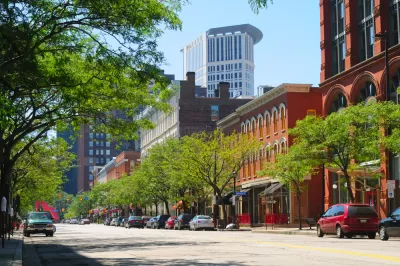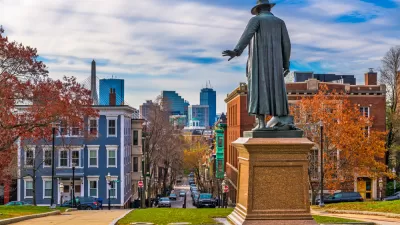The potential of form-based codes to re-legalize the historic fabric of Cleveland is explained for the nightly news audience.

"The city of Cleveland is piloting a project to move toward 'form-based coding' to update the city's zoning practices," reports Homa Bash.
According to Bash, planners in Cleveland are touting the potential of form-based codes to recover some of the historic fabric that has been lost since the city last approved its zoning code, in 1929. Noted especially in the article: the ability of form-base codes to bring buildings closer to the street.
The city is testing form-based codes in the Detroit Shoreway neighborhood, with additional tests scheduled for the Opportunity Corridor and Hough.
Freddy Collier, director of Cleveland City Planning Commission, is quoted in the article saying, "With form based zoning, we really start to focus on our commercial corridors as a place of emphasis and the residential fabric that exists in many of our neighborhoods, that will remain intact." Kyle Reisz, chief city planner for Cleveland, is also featured in the article and in the telecast shown above.
Past Planetizen coverage of the Cleveland code update:
- Is Cleveland Ready for a New Zoning Code? (March 2016)
- Cleveland Seeking Better Fortunes with a New Zoning Code (October 2015)
FULL STORY: City of Cleveland piloting project to improve outdated zoning practices for more walkable neighborhoods

Study: Maui’s Plan to Convert Vacation Rentals to Long-Term Housing Could Cause Nearly $1 Billion Economic Loss
The plan would reduce visitor accommodation by 25,% resulting in 1,900 jobs lost.

North Texas Transit Leaders Tout Benefits of TOD for Growing Region
At a summit focused on transit-oriented development, policymakers discussed how North Texas’ expanded light rail system can serve as a tool for economic growth.

Using Old Oil and Gas Wells for Green Energy Storage
Penn State researchers have found that repurposing abandoned oil and gas wells for geothermal-assisted compressed-air energy storage can boost efficiency, reduce environmental risks, and support clean energy and job transitions.

Private Donations Propel Early Restoration of Palisades Playground
Los Angeles has secured over $1.3 million in private funding to restore the Pacific Palisades playground months ahead of schedule, creating a modern, accessible space that supports community healing after recent wildfires.

From Blight to Benefit: Early Results From California’s Equitable Cleanup Program
The Equitable Community Revitalization Grant (ECRG) program is reshaping brownfield redevelopment by prioritizing projects in low-income and environmental justice communities, emphasizing equity, transparency, and community benefits.

Planting Relief: Tackling Las Vegas Heat One Tree at a Time
Nevada Plants, a Las Vegas-based nonprofit, is combating the city’s extreme urban heat by giving away trees to residents in underserved neighborhoods, promoting shade, sustainability, and community health.
Urban Design for Planners 1: Software Tools
This six-course series explores essential urban design concepts using open source software and equips planners with the tools they need to participate fully in the urban design process.
Planning for Universal Design
Learn the tools for implementing Universal Design in planning regulations.
Ascent Environmental
Borough of Carlisle
Institute for Housing and Urban Development Studies (IHS)
City of Grandview
Harvard GSD Executive Education
Toledo-Lucas County Plan Commissions
Salt Lake City
NYU Wagner Graduate School of Public Service




























